Editor’s Note: Sign up to get this weekly column as a newsletter. We’re looking back at the strongest, smartest opinion takes of the week from CNN and other outlets.
In Shakespeare’s “Hamlet,” Laertes is about to head back to his studies in Paris when his father Polonius offers some parting advice: Dress in a “rich, not gaudy” manner, “for the apparel oft proclaims the man,” the father says, before adding, “Neither a borrower nor a lender be.” Polonius, the chief counselor to King Claudius, can afford to insulate his son from any worries about money.
That’s not the case for millions of Americans who have had no choice but to borrow – especially given that four years of college, including living expenses, now can cost more than $140,000. For many of these Americans, President Joe Biden’s decision last week to forgive up to $20,000 in student debt is welcome news. The move also touched off a nationwide debate over who will benefit and who will not, with a multitude of views about fairness and the short- and long-term consequences.
“The cost of higher education has skyrocketed over the course of four decades,” wrote historian Julian Zelizer, “and for Americans who have been crushed under the weight of student loans, Biden’s move is a big deal.” Like his Democratic predecessors in the White House, Biden took an incremental step that could set the stage for further action in the future, Zelizer noted.
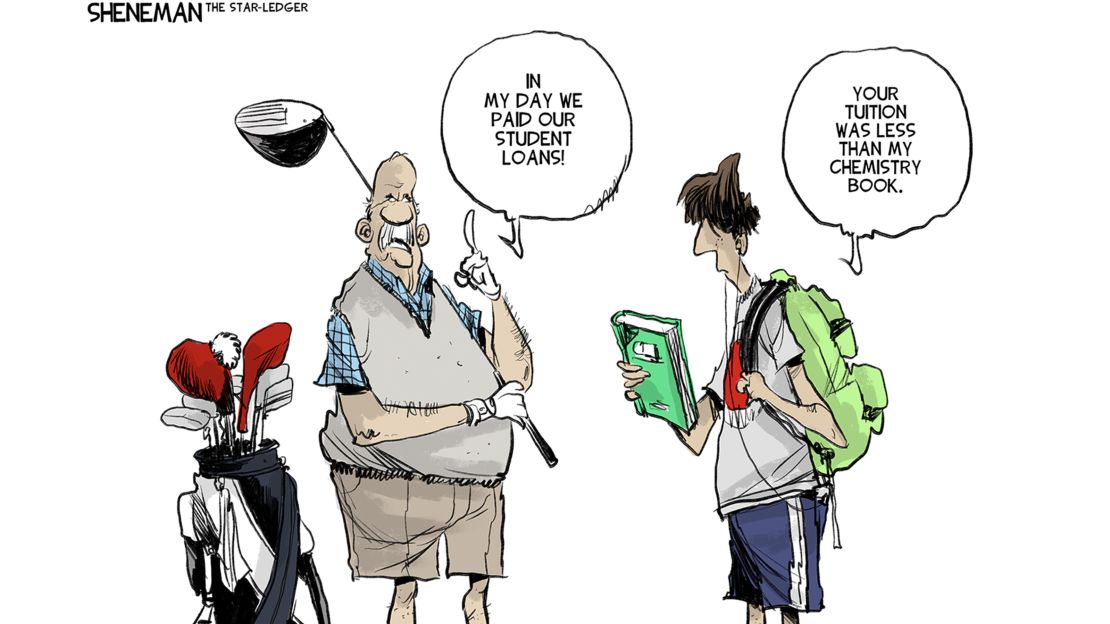
Writing for CNN Business Perspectives in advance of the decision, Derrick Johnson and Wisdom Cole of the NAACP had urged Biden to go further: “Biden must recognize and regard student debt as a racial and economic justice issue. Canceling $50,000 or more per borrower would free millions of Americans, allowing them to become more active participants in the US economy. It would also drastically reduce the racial wealth gap.” The President opted to limit debt forgiveness to $20,000 for Pell Grant recipients earning less than $125,000 and $10,000 for all others, with the same income cap.
But as Charlie Dent noted, even some Democratic economists fear the move could add fuel to the inflation fire. Moreover, Dent agreed with Sen. Roy Blunt’s list of objections to the executive action. Blunt had pointed to “the disproportionate benefits to wealthier Americans, the failure to address the cost of college, and Biden’s lack of legal authority to implement such a sweeping spending program. Spot on, Senator,” Dent wrote.
“Transferring the obligations of people who incurred student loan debts to millions of working taxpayers whose own debts or loans were never forgiven is not only unfair but politically perilous,” argued Dent, a former Republican member of Congress.
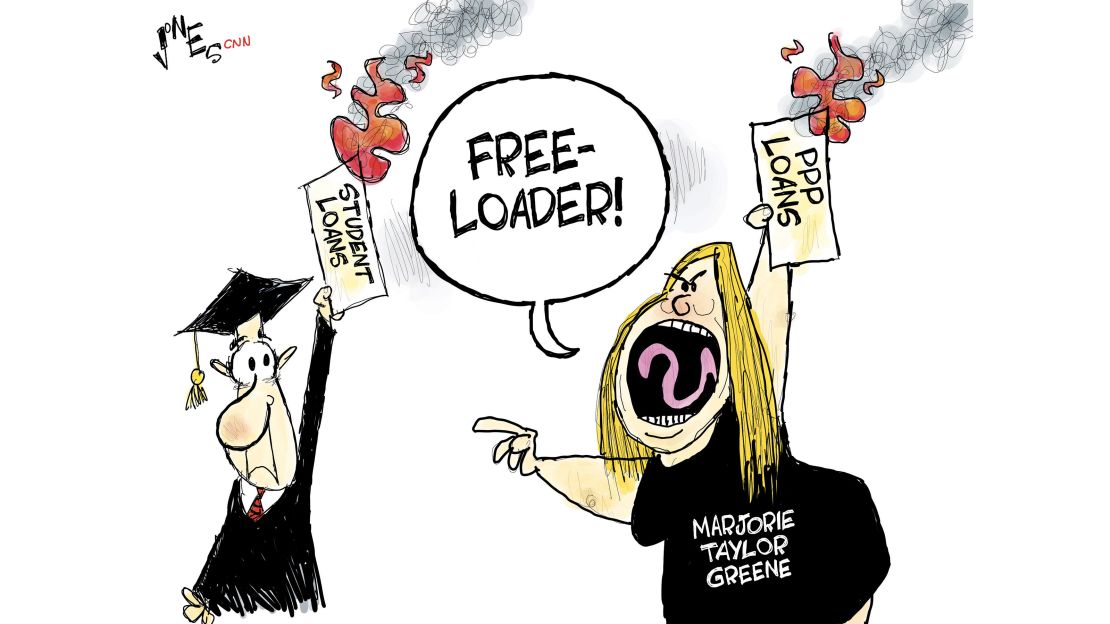
The fairness question renewed discussion of loans forgiven under the Covid-era Paycheck Protection Program. As Mathew Cantor noted in the Guardian, “The Georgia congresswoman Marjorie Taylor Greene said it was ‘completely unfair’ for the government to ‘say your debt is completely forgiven’ – after her loan of more than $180,000 was forgiven, the official White House (Twitter) account noted. It was just one of a series of digs at critics: the Florida congressman Matt Gaetz, the White House said, had more than $482,000 in PPP loans forgiven, while the Pennsylvania congressman Mike Kelly got off the hook for more than $987,000.”
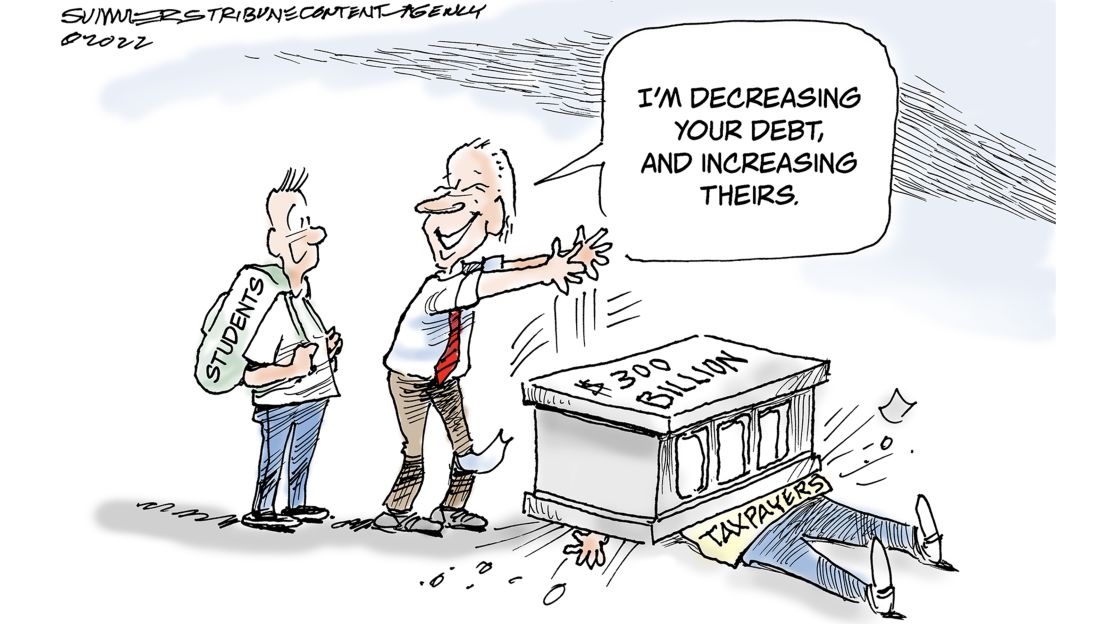
Midterms: What do you think?
Voters are fired up about the November election in the US. As SE Cupp wrote, Gallup’s measure of voter “intensity” is higher than the summer months preceding every election between 1998 and 2014. They’re are right to be deeply engaged in this year’s contest, given the high stakes.
“From inflation to a possible recession, the overturning of Roe v. Wade and rolling back of abortion access in many states, mass shootings and gun reform, immigration challenges at our borders, a war between Russia and Ukraine, and the continued fallout from Covid, American voters have a plethora of issues they must consider during this critical election cycle,” Cupp wrote.
In the coming weeks, CNN Opinion will be featuring many perspectives on the key issues – and we want to hear from you. Fill out the form here.
Last Tuesday’s special election in New York’s 19th congressional district sent one message, wrote Jill Filipovic, who lives there. It’s a classic swing seat: Joe Biden narrowly won the support of voters in the Hudson Valley district in 2020, but Donald Trump captured it in 2016 as did Barack Obama in 2008 and 2012.
“Walk down Warren Street in Hudson, and you’re more or less in Brooklyn North, with natural wine bars, single-origin coffee houses and art galleries adorned in rainbow flags. Drive across the river into the more rural reaches of Greene County and you may as well be in a red state, complete with Trump and ‘Let’s Go Brandon’ signs, and a few that include Biden’s name – with an expletive in front of it.”
This year, Democrat Pat Ryan won, and he might have the conservative majority on the Supreme Court to thank, since he campaigned heavily on abortion rights in the wake of the overturning of Roe v. Wade. “It’s becomingly increasingly clear that when abortion rights are on the ballot, abortion rights win,” wrote Filipovic.
After months of gloom, Democrats may be overconfident now, wrote Jeffrey Rosen and Kevin Kosar. “They are touting this Congress’ legislative enactments, nearly all of which involve massive federal spending – a Covid-19 bill, an infrastructure bill, a semiconductor bill, a veterans health bill and the Inflation Reduction Act.”
Get our free weekly newsletter
“None of these seems likely to be historically consequential in policy terms, but they are record-breaking in the size of their spending and have contributed to inflation. The result is a worsening US economy that has already contracted for at least six months… Today, the public remains sour on the Biden economy, and, by proxy, his party, despite all the spending hype.”
What accounts for the Democrats’ improved performance in recent special elections? Ruy Teixeira wrote in his Substack newsletter that White college graduate voters, who strongly supported Biden in 2020, are “answering the bell” again. “These voters are less sensitive to economic problems and more likely to be moved by a social issue like abortion rights, which looms large in their world view. In short, they are the perfect voters for Democrats in the current environment.”
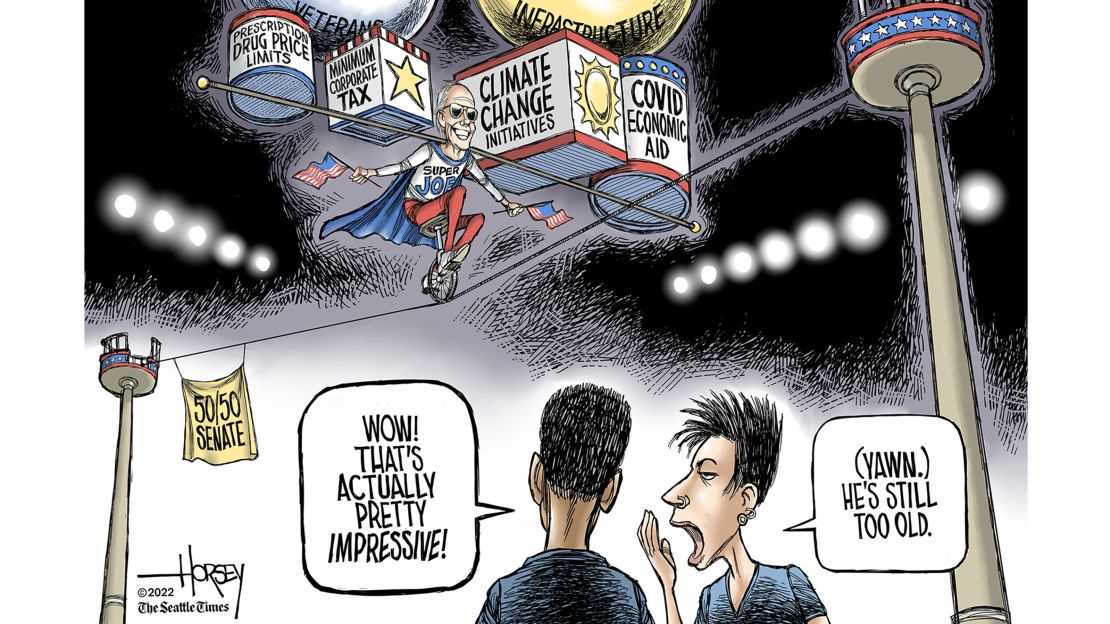
For more:
Dean Obeidallah: Mitch McConnell just made the 2022 election about Trump’s political future
Ukraine after six months
Wednesday marked six months since Russian troops invaded Ukraine. President Vladimir Putin’s war went badly for his side right at the start, when the government in Kyiv held firm and Ukraine’s President Volodymyr Zelensky soon proved to be a passionate and effective voice for his country on the world stage. In recent months, the two sides have settled into a war of attrition, with fearsome human losses and few territorial gains.
One lesson, wrote Daniel Treisman, is that “unconstrained autocrats make horrendous mistakes. Quite often, they start revisionist wars to redress ‘historical injustices.’ These have a way of going badly – from Argentine President Leopoldo Galtieri’s attempt to seize the Falkland Islands from the UK in 1982 and Saddam Hussein’s invasion of Kuwait in 1990 to the Greek generals’ attempted coup in Cyprus in 1974. But past failures have not stopped strongmen from repeating such blunders. If there’s anything we can take away from the Russian invasion of Ukraine, it’s that we cannot plan only to defend against attacks that seem rational.”
In Russia, he added, “polls suggest a growing urge to tune out the war completely. In July, 32% of Russian respondents said the ‘special military operation’ was the most memorable event of the previous four weeks, down from 75% in March, according to the Levada Center.”
In Moscow, though, the reverberations of last week’s car bombing, which killed political commentator Darya Dugina, were impossible to ignore. Russia accused Ukraine of responsibility for the attack, while Ukraine denied any involvement.
“Dugina was the daughter of Alexander Dugin, an influential nationalist thinker who has many admirers in the global far right,” wrote Russia scholar Peter Rutland. “It seems possible that he was the intended target since he reportedly switched cars at the last minute.”
“While some nationalists condemn Putin for launching a war against a fellow Slavic people, Dugin is among those nationalists who criticize Putin for not pursuing the war against Ukraine more aggressively. His most recent article – likely written before the car bombing and published on a nationalist website on Aug. 21, the day after his daughter’s death – calls for regime change in Russia, arguing that the present system cannot survive more than six months.”
For more:
Cristian Gherasim: In Eastern Europe, refugee support meets disinformation
The Mar-a-Lago affidavit
On Friday, the Justice Department released a heavily redacted version of the affidavit it submitted to obtain court approval to search former President Donald Trump’s Florida residence, Mar-a-Lago.
“Even with redactions,” write Norman Eisen and Shan Wu, “the affidavit adds to our understanding not just of the legal theory but of its factual basis. … we learned what was in the 15 boxes that were ultimately returned in January 2022 after a year of back and forth. They included ’184 unique documents bearing classification markings, including 67 documents marked as CONFIDENTIAL, 92 documents marked as SECRET, and 25 documents marked as TOP SECRET.’”
In the New York Times, Andrew Weissmann wrote, “Especially with information classified at that level, the government doesn’t get to pick and choose to defend the nation’s top secrets based on politics – it doesn’t matter if the person in question is a Democrat or Republican, a former president, a secretary of state or Edward Snowden. These documents belong to the government, and their having been taken away posed a clear risk to our national security.”
‘Stand with Sanna’

What are people chatting about in the saunas and coffee shops of Finland? Their 36-year-old prime minister’s dance moves. Marja Heinonen noted that a viral “video showed Sanna Marin, laughing, cavorting, hips swiveling – having frankly, what seemed to be the time of her life – at what she later told the press was a private party with friends.” Additional social media posts, along with photos of other guests at her official residence, later surfaced.
The controversy goes back to the start of Marin’s term as prime minister. “Shortly after assuming the prime minister’s post,” Heinonen wrote, “she appeared in a magazine photo spread, wearing a blazer but no blouse underneath, scandalizing critics here and abroad. Marin’s supporters have rallied around her, however. In response to that controversy, women across Finland – and in some other countries, too – posted pictures of themselves online in similar states of undress, with the hashtag #imwithsanna…”
There was a similar response this time around, with women rushing to show their support by posting videos of themselves dancing.
“While not all of us are posting dance videos, ‘stand with Sanna’ seems to be the consensus view among Finns. Most of us are unbothered, many of us even amused, by the uproar. In short, many Finns – so far at least – have her back.”
Dr. Fauci
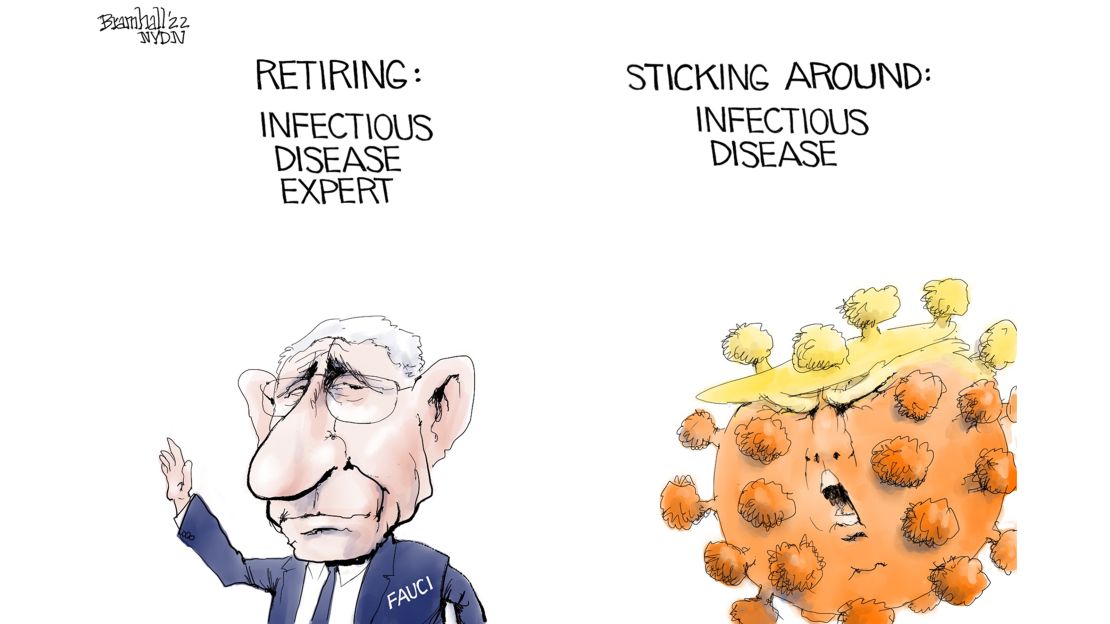
Dr. Anthony Fauci, the longtime director of the National Institute of Allergy and Infectious Diseases, announced that he will be stepping down in December, when he will turn 82. Fauci came to prominence during the early years of the AIDS epidemic and overcame harsh criticism from activists to emerge as “something of a hero in the fight against the infection,” wrote Dr. Kent Sepkowitz. “Much of Fauci’s national ascent related more to his steadiness, decency, Boy Scout rectitude and ability to speak in plain language than to a specific expertise in disease management.
“This spokesman role continued through subsequent presidents and infections to great acclaim until his well-characterized collision with the Trump White House over management of Covid-19. Fauci’s crime, according to a critical piece of the public, appeared to be that he tried to guess what was coming next from a never-seen-before pandemic. When he was wrong, he was accused of misleading the public. Many, it seems, expected Fauci to be a fortuneteller and failed to recognize that all medical experts are tasked with making their best judgment calls when faced with uncertainty. Some of those calls will inevitably turn out to be incorrect.”
In the history books, Sepkowitz wrote, “What likely will stick out about Fauci’s leadership will be not his intelligence, doggedness and humbling work ethic but rather this: He is a true believer in the importance of improving the public’s health, even at personal cost.”
Writing for Slate, Tim Requarth observed that “Fauci’s strength as a communicator relied on projecting an air of neutral scientific authority, but in reality, that was always a bit of legerdemain – for him, or any scientist. So many of the controversies of this pandemic aren’t about facts, but values. That the mRNA vaccines save lives is an empirical fact. Whether we should mandate them is a political choice. When Fauci advocates for vaccine mandates – even if it’s consistent with the principles of public health – he’s taking a position that elevates collective benefit over individual choice. I happen to share those values, but a large swath of America doesn’t.”
The Dream lives

It was 59 years ago on August 28 that Rev. Martin Luther King Jr. addressed a quarter-million people at the March on Washington for Jobs and Freedom. His “soaring, panoramic” speech became famous for the “indelible” line, “I have a dream,” as historian Peniel E. Joseph noted.
“Against the backdrop of the racial and political reckoning of 2020 and the racial progress and political backlash that have followed, it is worth asking the question: Is the dream that King spoke of at the March on Washington alive in our own time?”
“The answer is a resounding yes.” Despite “the most divisive political climate in perhaps more than a century,” Joseph wrote, the Biden administration has invested in stimulus payments that benefited “workers of color” and infrastructure spending that will help “racially segregated and economically impoverished areas” while achieving measures to aid consumers coping with high prescription drug prices and student debt.
“That dream, bruised, bloodied and tattered, remains hopefully alive in the present. All it requires of us is to unburden ourselves of the cynicism the nation too often basks in, peddles to one another, and exploits for economic and political advantage, and look around at what we have been able to accomplish together.”
For more:
Elizabeth Korver-Glenn: The 1936 manual that enshrined racism in America’s housing
Don’t miss
Marco Rubio: Why the Artemis I launch is so important
Keri Blakinger: Why I’ll never forget having my period in prison
Rabbi Jeffrey Myers: Remembering a mass shooting that most Americans have forgotten
Issac Bailey: As a kid, a book I wasn’t looking for changed my life
Ruth Ben-Ghiat: Businesses strike back as DeSantis criticizes corporate America
Lindsey Mantoan: Why I’m finally forgiving ‘Game of Thrones’ for that abysmal ending
AND…
Dogs will have their day

When the isolation of the Covid-19 pandemic arrived in 2020, people on both sides of the Atlantic rushed to acquire a pet. In the UK, Holly Thomas was a little late to the trend. “I bowed to temptation and got a dog this year, long after doing so ceased to be chic, and the omnipresent sense of dread even informed the breed I chose.”
“I didn’t just want a pet, I wanted a bodyguard … I wanted it to be so huge that no thief in their right mind would attempt to haul it away. In the end, I chose a Rottweiler.”
But now as “crisis followed crisis,” Thomas observed, “our pets have become a bellwether for the prevailing emergency, which in 2022, is economic. As the cost of living rockets in the UK, owners are increasingly unable to afford to keep their pets. The Dogs Trust says inquiries about giving up dogs are at their highest ever, and the Royal Society for the Prevention of Cruelty to Animals has warned that shelters are ‘drowning.’”
“Stateside, the ASPCA notes that some shelters are seeing a surge in intake and a drop in adoptions this year, while the Bureau of Labor Statistics says the cost of pets and pet products swelled by 8.3% between May 2021 and May 2022…”
“Trends tell stories. This one tells of financial desperation so acute it’s forcing people to part with living, breathing lifelines.”





